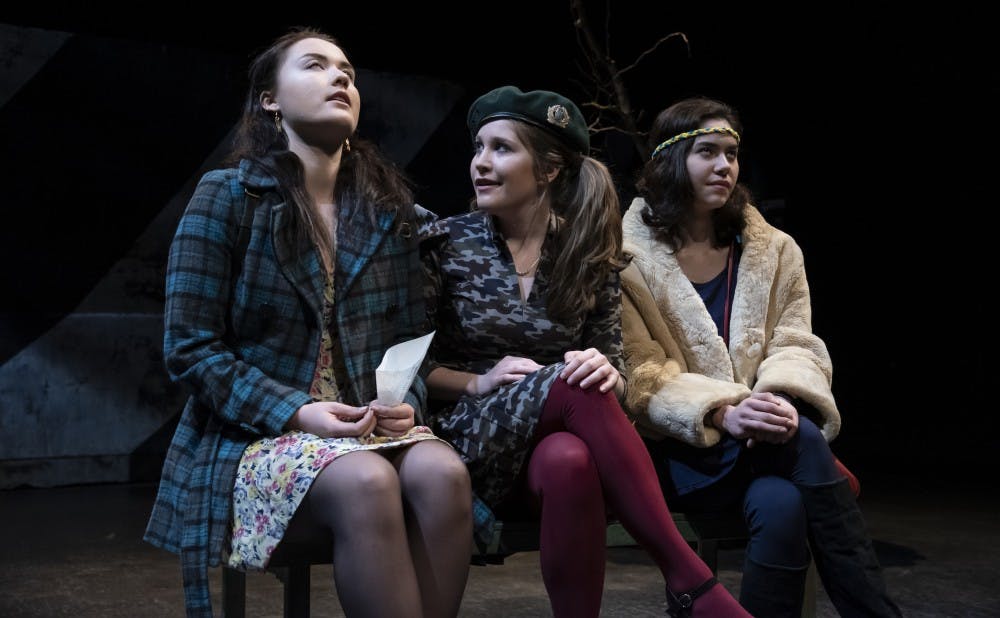There is a moment of utter depravity in the fifth of six vignettes that comprise Natal’ya Vorozhbit’s play “Bad Roads,” a scene so chillingly vile that it is legitimately difficult to watch. A soldier beats, sexually violates and finally urinates on a female journalist he has taken hostage, a sequence that feels as though it was lifted directly from a snuff film — or a documentary.
Filled to the brim with similar moments of shocking human violence, “Bad Roads” is a “documentary play”, a starkly realistic account of the lives of the women along the frontlines of the ongoing conflict in Ukraine. Vorozhbit pulls from her own experiences and the experiences of those around her to craft a devastating story about how war unspools humanity and how humanity nevertheless rebounds. There isn’t much along the lines of hope in the play — which is only to be expected given the horrifying circumstances — but the deeply unpleasant vignettes each manage to mine a sour sort of optimism about the human condition out of their flint-hard characters. Otherwise, the play is a grueling trip through war-torn Ukraine, its rare moments of levity inevitably punctured by the discomfiting reminder that this is still happening.
For the most part, the cast rises to the task of depicting these multifaceted and oftentimes unlikeable characters with dimension and sympathy. The seven cast members — all of whom are women — are each responsible for multiple roles, several of which are physically or emotionally demanding, but they do commendable work transitioning from scene to scene without losing their character in the shuffle. Sophomore Kaylin Woodward in particular is remarkable, taking on the role of the aforementioned female journalist who is subjected to violence and humiliation before finally turning on her captor in a twist that might have come across as cheaply triumphant in the hands of a less capable actress; instead, Woodward turns the already harrowing segment into a truly haunting mediation on good and evil.
The rest of the performances are excellent in their own right — Darya Andreichenko is another standout, anchoring both of her vignettes with a well-realized sense of frenetic desperation and lack of control — but are often affected by the quality of the segment. The first segment in particular feels lacking, at once both rushed and interminably slow, and fails to deliver shocks or laughs with its extensive monologues about the grimy drudgery of war and winking fourth wall breaks. Most of the weight falls to segment lead Jinny Yoon to keep the vignette running and she wavers more than once, which is perhaps why the second segment feels so refreshingly grounded and brisk in comparison. A story of three young girls waiting for their suitors to collect them, the vignette is a much more compelling glimpse into the lives of those impacted by the war. The play — and, in turn, the performances — are at their best when the stakes are low, when the story trades grander and grimmer tales of field hospitals and attacks for petty arguments and soured relationships.
What makes this production truly excellent, even when its dramatic mechanisms aren’t running smoothly, is its lighting and sound design. The lighting is breathtaking at times, ebbing and flowing out of scenes like a sun rising and setting, casting long shadows that hover over the actors like specters. Occasional bursts of red light serve as explosions; the beautifully simple blink of a car’s emergency light illuminates the second half of the fourth vignette, effortlessly maintaining the scene’s tension. The sound design also provides a lushness to the otherwise dank, chilly set, turning a bench into a running Jeep with a single well-timed engine sound. Musical interludes score the transitions between vignettes, most of which are unsettling bursts of electronic sound that preserve the uneasiness established in the scene before. Perhaps most effective is the use of music: There are two brief musical performances, both of which are absolutely stunning in their gut-wrenching simplicity and so well-performed that the audience does not need to understand the foreign lyrics to appreciate their emotional resonance.
“Bad Roads” may be a tough watch at times, but it is ultimately a rewarding, if not slightly disheartening, treatise on humanity and what we can do to one another on both large and small scales. At once dreary and piercing, it is a tale worth being told, particularly by such a committed and talented cast and crew, all of whom appear to have put forth tremendous effort to respectfully share these stories. Even in its moments of depravity and horror, it is a captivating, memorable experience that refuses to let up until the final bows.
Get The Chronicle straight to your inbox
Sign up for our weekly newsletter. Cancel at any time.

